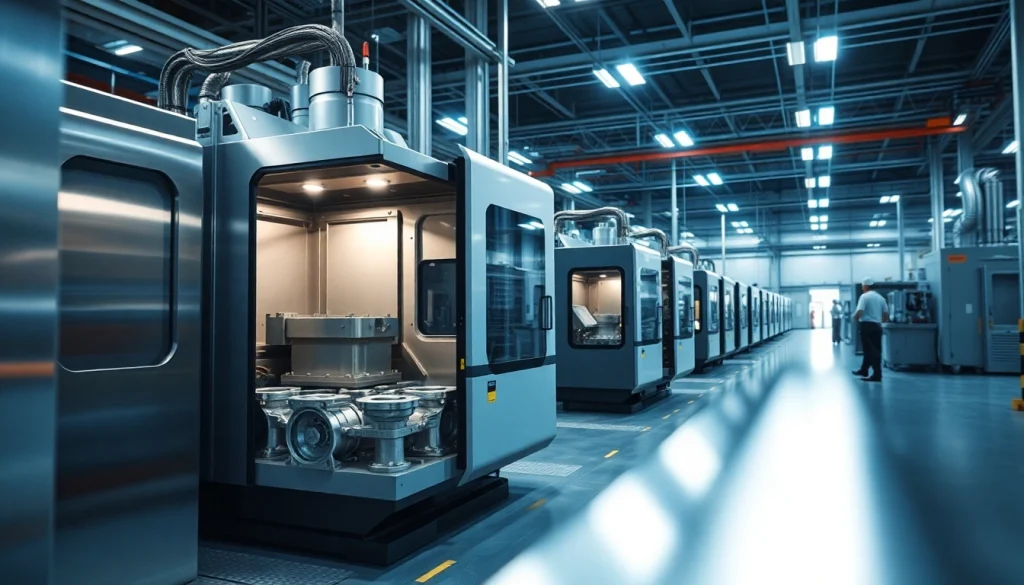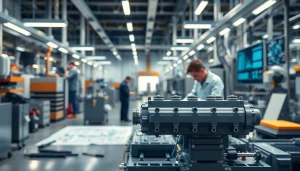Professional Precision Die Casting Malaysia: Your 2025 Guide to Quality Parts

Understanding Precision Die Casting in Malaysia
Precision die casting is a manufacturing process that is crucial for producing high-quality metal components across various industries. In Malaysia, this technique has gained significant traction due to the country’s robust manufacturing framework and skilled workforce. Companies dedicated to precision die casting malaysia have developed advanced capabilities, making Malaysia a competitive player in the global market.
What is Precision Die Casting?
Precision die casting refers to the process of forcing molten metal into a mold, where it cools and solidifies into a specific shape. This method is particularly favored for its ability to produce intricate designs with high precision and minimal waste. Common metals used in this process include aluminum, zinc, magnesium, and copper alloys. The precision of this technique makes it ideal for industries that demand high-quality parts, such as automotive, electronics, and aerospace.
Applications Across Various Industries
The versatility of precision die casting allows it to serve a multitude of sectors. Here are some key applications:
- Automotive: Components such as engine blocks, transmission housings, and other critical parts.
- Aerospace: Lightweight and durable parts for aircraft and spacecraft.
- Electronics: Enclosures and heat sinks for various electronic devices.
- Consumer Goods: High-quality casings for appliances and tools.
- Telecommunications: Essential parts for networking equipment.
Benefits of Die Casting Technology
There are several advantages to using precision die casting, including:
- High Dimensional Accuracy: Tight tolerances are achievable, often within ±0.1 mm, depending on the complexity of the part.
- Reduced Material Waste: The process minimizes scrap due to its near-net shape capability.
- Rapid Production Rate: High-volume production is possible, leading to cost savings and efficiency.
- Excellent Surface Finish: Die casting produces parts with a smooth surface finish, reducing the need for additional machining.
Key Players in Malaysia’s Die Casting Industry
Leading Die Casting Manufacturers
Malaysia is home to a number of reputable die casting manufacturers known for their quality products and innovative processes. Notable companies include:
- Sena Die Casting: Specializes in precision die casting for various sectors, leveraging state-of-the-art technology to enhance production efficiency.
- HICOM Diecastings: A leader in aluminum die casting, providing high-quality solutions tailored to client needs.
- MK Precision Castings: An established player focused on developing customized parts for diverse applications.
Innovative Technologies Used
To stay competitive, Malaysian manufacturers have embraced numerous innovative technologies, including:
- Computer-Aided Design (CAD): Streamlining the design process for more complex geometries.
- Advanced Simulation Software: Allowing for better prediction of mold filling and cooling behaviors to improve quality.
- Robotics and Automation: Enhancing production speed and consistency while reducing labor costs.
Success Stories: Case Studies from Top Companies
Examining case studies helps illustrate the impact of precision die casting. For example, a leading automotive supplier in Malaysia implemented advanced die casting techniques to reduce production time by 30%, enabling them to meet increasing global demands effectively. Additionally, a well-known electronics manufacturer successfully integrated die casting into their production line, resulting in a 25% reduction in material costs without compromising quality.
Best Practices for Precision Die Casting
Quality Control Measures
Maintaining high-quality standards is vital in precision die casting. Best practices include using statistical process control (SPC) to monitor the production process, conducting regular inspections, and implementing rigorous testing for mechanical properties of the casted parts.
Materials Selection and Usage
Choosing the right materials is fundamental to achieving the desired characteristics in finished products. Factors such as the mechanical properties, corrosion resistance, and thermal conductivity must be considered. Aluminum and zinc alloys are commonly preferred due to their favorable properties and ease of casting.
Sustainability in Die Casting Operations
With the global emphasis on sustainability, Malaysian die casting companies are adopting greener practices. These include recycling metal scrap, utilizing energy-efficient technologies, and reducing emissions during the manufacturing processes to align with environmental standards.
Challenges in Die Casting and Solutions
Common Industry Challenges
Despite its advantages, the precision die casting industry faces several challenges, such as:
- Material Shortages: Fluctuations in raw material availability can disrupt production schedules.
- Quality Control Issues: Variations in temperature and pressure during casting can lead to defects.
- Skilled Labor Shortages: A lack of trained technicians can impact the industry’s efficiency and output quality.
Mitigation Strategies for Quality Issues
Implementing quality assurance protocols and training programs can significantly mitigate these challenges. Regular maintenance of machinery and adherence to best practices are essential to maintain quality throughout the production cycle.
Future-Proofing Your Operations
To remain competitive, manufacturers should explore investing in advanced technologies, such as Artificial Intelligence (AI) for predictive maintenance and process optimization. By keeping up with industry trends and consumer demands, companies can ensure their operations meet future challenges head-on.
Trends Shaping the Future of Die Casting in 2025
Emerging Technologies and Innovations
The die casting industry is on the brink of a technological revolution. Innovations such as 3D printing for mold design and the use of AI for process automation are expected to transform manufacturing practices. Additionally, advancements in materials science will open new avenues for lightweight yet durable components.
Market Forecast for Die Casting in Malaysia
The market for precision die casting in Malaysia is projected to grow significantly, driven by the increasing demand from the automotive and electronics sectors. By 2025, experts anticipate a rise in both domestic and export sales, as manufacturers enhance their capabilities and expand their product offerings.
Adapting to Changing Consumer Demands
As consumer preferences evolve, so too must manufacturers. There is a growing demand for customized solutions and short lead times, pushing companies to adopt flexible production methods that can quickly adapt to market changes without sacrificing quality.



